Emmett Till accuser, in memoir, denies wanting teen killed
Carolyn Bryant Donham says she tried to help Till after her husband and brother-in-law abducted the teen.

The white woman who accused Black teenager Emmett Till of making improper advances before he was lynched in Mississippi in 1955 says she neither identified him to the killers nor wanted him murdered.
In an unpublished memoir obtained by The Associated Press, Carolyn Bryant Donham said she was unaware of what would happen to the 14-year-old Till, who lived in Chicago and was visiting relatives in Mississippi when he was abducted, killed and tossed in a river.
Keep reading
list of 3 itemsEmmett Till’s relatives push for renewed probe into 1955 lynching
Why is there still no justice for Emmett Till?
Now 87, Donham was only 21 at the time. Her then-husband Roy Bryant and his half-brother JW Milam were acquitted of murder charges but later confessed in a magazine interview.
Till’s lynching is often referred to as a key spark for the civil rights movement after his mother’s held to have an open-casket funeral showing her son’s mutilated body.
The contents of the 99-page manuscript, titled, I am More Than A Wolf Whistle, were first reported by the Mississippi Center for Investigative Reporting. Historian and author Timothy Tyson of Durham, who said he obtained a copy from Donham while interviewing her in 2008, provided a copy to the AP on Thursday.
Tyson had placed the manuscript in an archive at the University of North Carolina with the agreement that it not be made public for decades, though he said he gave it to the FBI during an investigation the agency concluded last year. He said he decided to make it public now following the recent discovery of an arrest warrant on kidnapping charges that was issued for Donham in 1955 but never served.
“The potential for an investigation was more important than the archival agreements, though those are important things,” Tyson said. “But this is probably the last chance for an indictment in this case.”
A cousin of Till who leads the Emmett Till Legacy Foundation, Deborah Watts, said the memoir is new evidence that shows Donham’s involvement in the case and is particularly important when combined with the arrest warrant.
“I truly believe these developments cannot be ignored by the authorities in Mississippi,” she said.
In the memoir, Donham said she attempted to help Till once he had been located by her husband and brother-in-law and brought to her in the middle of the night for identification.
“I did not wish Emmett any harm and could not stop harm from coming to him, since I didn’t know what was planned for him,” Donham said in the manuscript compiled by her daughter-in-law. “I tried to protect him by telling Roy that ‘He’s not the one. That’s not him. Please take him home.’” She claimed in the manuscript that Till, who had been dragged from a family home at gunpoint in the middle of the night, spoke up and identified himself.
Donham added that she “always felt like a victim as well as Emmett” and “paid dearly with an altered life” for what happened to him.
“I have always prayed that God would bless Emmett’s family. I am truly sorry for the pain his family was caused,” she said at the end of the manuscript, which is signed “Carolyn” but indicated that it was written by her daughter-in-law Marsha Bryant.

The memoir was remarkable not only because it was the most extensive account of the sensational episode ever recorded by Donham, but also because it contained contradictions that raise questions about her truthfulness through the years, said Dale Killinger, a retired FBI agent who investigated the case more than 15 years ago.
For instance, Donham claimed in the memoir to have yelled for help after being confronted by Till inside the family grocery store in Money, Mississippi, yet no one ever reported hearing her screams, Killinger said. Also, Donham never previously mentioned that she and Roy Bryant chatted about the abduction. In the manuscript, she said they did.
“That seems ludicrous,” Killinger said. “How would you have a major event in your life and not talk about it?”
The Department of Justice closed its most recent investigation into the case in December and Mississippi authorities have not given any indication they plan to pursue the kidnapping warrant or other charges against Donham. But the Till family has been pushing authorities to act.
Keith Beauchamp, a filmmaker whose documentary preceded the Department of Justice probe in which Killinger was involved, and which ended without charges in 2007, said the memoir showed that Donham “is culpable in the kidnapping and murder of Emmett Louis Till and to not hold her accountable for her actions, is an injustice to us all.”
“Our fight will continue until justice is finally served,” Beauchamp said.
It was Beauchamp, along with two of Till’s relatives, who discovered the arrest warrant with Donham’s name on it earlier this month in the basement of a Mississippi court.

Tyson, the historian who provided the roughly 35,000-word manuscript to the AP, helped spur the government’s most recent investigation into the killing by publishing a book in 2017 in which he quoted Donham as saying she lied when she claimed Till grabbed her, whistled and made sexual advances. In the memoir, however, she claimed Till did do those things. During the most recent investigation, Donham told the FBI she had never recanted, the Department of Justice said.
Tyson said Donham’s statements in the memoir exonerating herself of wrongdoing need to be taken with “a good-sized shovel full of salt”, particularly her claim that Till identified himself to the men who took him from the family home and later admitted killing him.
“Two big white men with guns came and dragged him out of his aunt and great-uncle’s house at 2 o’clock in the morning in the Mississippi Delta in 1955. I do not believe for one minute that he identified himself,” Tyson said.
Neither Donham nor any of her relatives have responded to messages and phone calls from the AP seeking comment. It is unclear where Donham currently lives or if she has a lawyer. Her last known address was in Raleigh, North Carolina.